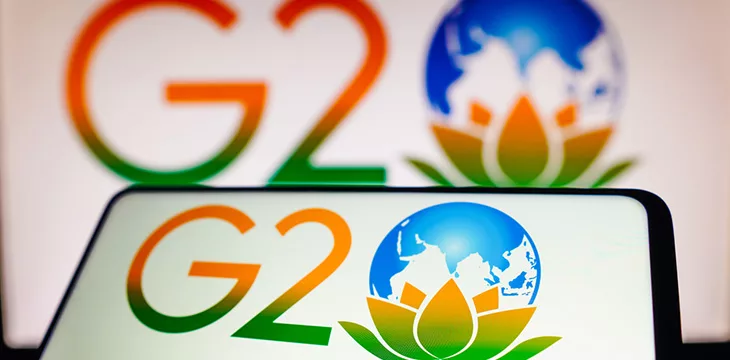|
Getting your Trinity Audio player ready...
|
India’s attempt at creating uniform standards for global digital currency regulations has received a jolt in the days leading to the G20 Summit.
Finance Minister Nirmala Sitharaman revealed that the negotiations are at an advanced stage for implementing standard guidelines for policing digital assets among G20 nations.
Leaders of G20 nations are expected to converge in New Delhi for a two-day G20 summit this month. Several issues are expected to be deliberated by the attending world leaders, including the reformation of the international debt architecture, food and energy security, and access to credit for developing nations.
While these are weighty issues in their own right, India has deployed considerable resources toward developing an international framework for regulating digital assets. India has been spearheading the G20 since assuming its presidency in November 2022, listing the control of digital assets as the top priority.
“India’s (G20) presidency has put on the table key issues related to regulating or understanding that there should be a framework for handling issues related to crypto assets,” said Sitharaman.
The spillover effect of large-scale industry collapse on the financial system and the borderless nature of digital assets was enough incentive for India. Wary of the threat of digital currencies to local economies, India rallied G20 nations to its crusade with a string of conferences early in the year.
Finance ministers and central bank governors gathered in Bengaluru to lay the building blocks for the proposed global digital currency regulatory framework. India’s plan also enlisted the help of international agencies like the Financial Action Task Force (FATF), the International Monetary Fund (IMF), and the Bank for International Settlements (BIS).
India’s proposed international regulatory framework will require digital currency service providers to seek licenses across jurisdictions with common standards. The rules are pushing for greater cooperation between nations to crack down on attempts to exploit regulatory arbitrage.
“We are talking to all nations, that if it requires regulation, then one country alone cannot do anything,” said Sitharaman. “We are talking with all nations, if we can make some standard operating procedure which is followed by everyone to make a regulatory framework, and if it can be effective.”
Making the ultimate sacrifice
While India has been at the forefront of global regulatory attempts, it is essential to note that the South Asian country does not have comprehensive local rules for digital assets. Experts insist that the government brought its attempts to establish digital asset rules to a grinding halt in favor of its G20 ambitions.
Experts suggest that the central government is waiting for the outcome of its deliberations with G20 nations to model local rules after an international framework.
Currently, India imposes stringent tax measures for digital currency service providers and retail investors. At the same time, the Reserve Bank of India (RBI) continues to view the asset class as a Ponzi scheme.
Watch Anup Pai & Kumaraguru Ramanujam: India is ripe for decentralization

 02-22-2026
02-22-2026 




